Please fasten your belts!
Etherspot and Mantle Network partner to transform the Ethereum ecosystem
Etherspot and Mantle Network have partnered to bring account abstraction to Mantle, aiming to revolutionize the Ethereum ecosystem.
The collaboration focuses on developing both on-chain and off-chain solutions to enable higher transaction volumes, lower costs, and a more seamless user experience for decentralized applications (dApps).
Etherspot’s expertise in AA will be leveraged to create an independent on-chain stack, maintaining Ethereum’s core security principles.
An independent off-chain stack, including Skandha Bundler Service and Paymaster services, will also be established for faster transactions.
A key feature is integrating Etherspot’s Arka Paymaster service into Mantle Network’s infrastructure, enhancing the gas user experience and improving user acquisition and retention.
This partnership is poised to open a new era of innovation for Ethereum, making Mantle Network’s services more accessible to a wider audience.
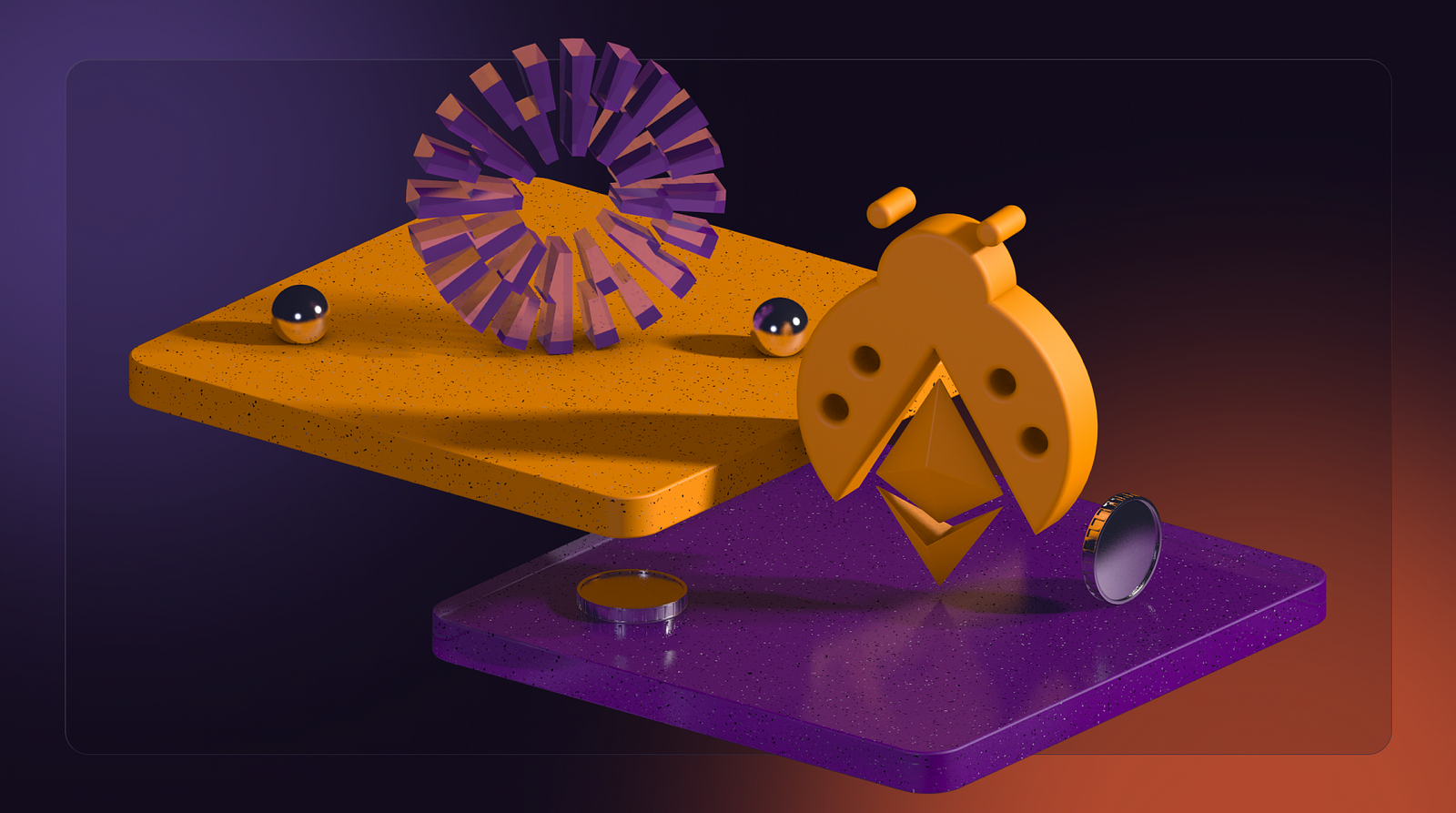
Activation of Account Abstraction endpoint on Arbitrum’s One and Nova mainnets
Arbitrum has officially activated support for the account abstraction endpoint on its One and Nova mainnets following the successful passage of AIP-2. This proposal is aimed to introduce a new RPC endpoint, eth_sendRawTransactionConditional, to address a specific challenge related to bundled transactions.
The new endpoint allows users to specify valid ranges for block height and timestamps, thereby enabling sequencers to reject transactions that do not meet the conditions for inclusion during the validation stage.
This development aligns with EIP-4337.
Activating this endpoint is expected to enhance the efficiency and security of L2 transactions on Arbitrum. Offchain Labs has already implemented this endpoint in the v.2.0.14 update to Nitro, and it is now live on the Arbitrum testnet.
This significant development is part of a broader movement within the Ethereum community to develop account abstraction standards.
It demonstrates Arbitrum’s commitment to innovation and alignment with emerging industry standards, reflecting a forward-thinking approach that may lead to potential improvements in user experience within the broader Ethereum ecosystem.
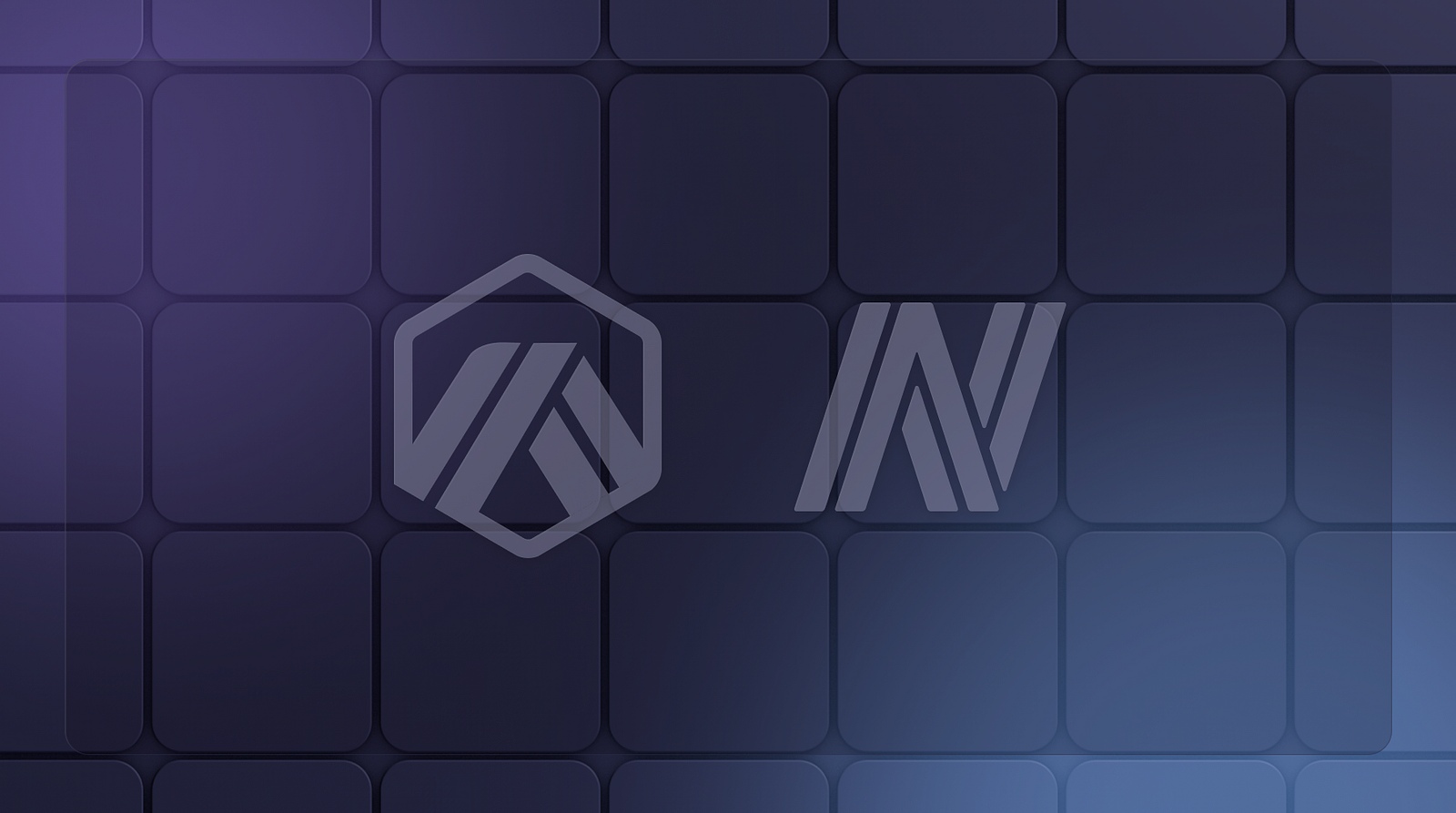
Etherspot and Onramper open up a new era of fiat-to-crypto transactions
Etherspot has announced its successful integration with Onramper, a leading fiat-to-crypto onramp aggregator.
This collaboration aims to simplify the process of converting fiat currency into crypto for Etherspot smart wallet users.
Onramper, known for its extensive coverage of over 95 fiat and 240+ cryptocurrencies, offers users a seamless and cost-effective way to buy crypto.
The integration into Etherspot’s SDK allows developers to provide a frictionless solution for purchasing cryptocurrencies via fiat in their decentralized applications (dApps), promoting wider adoption of Web3.
We believe this partnership is a significant step towards creating a user-friendly environment and unlocking the true potential of the Web3 space.
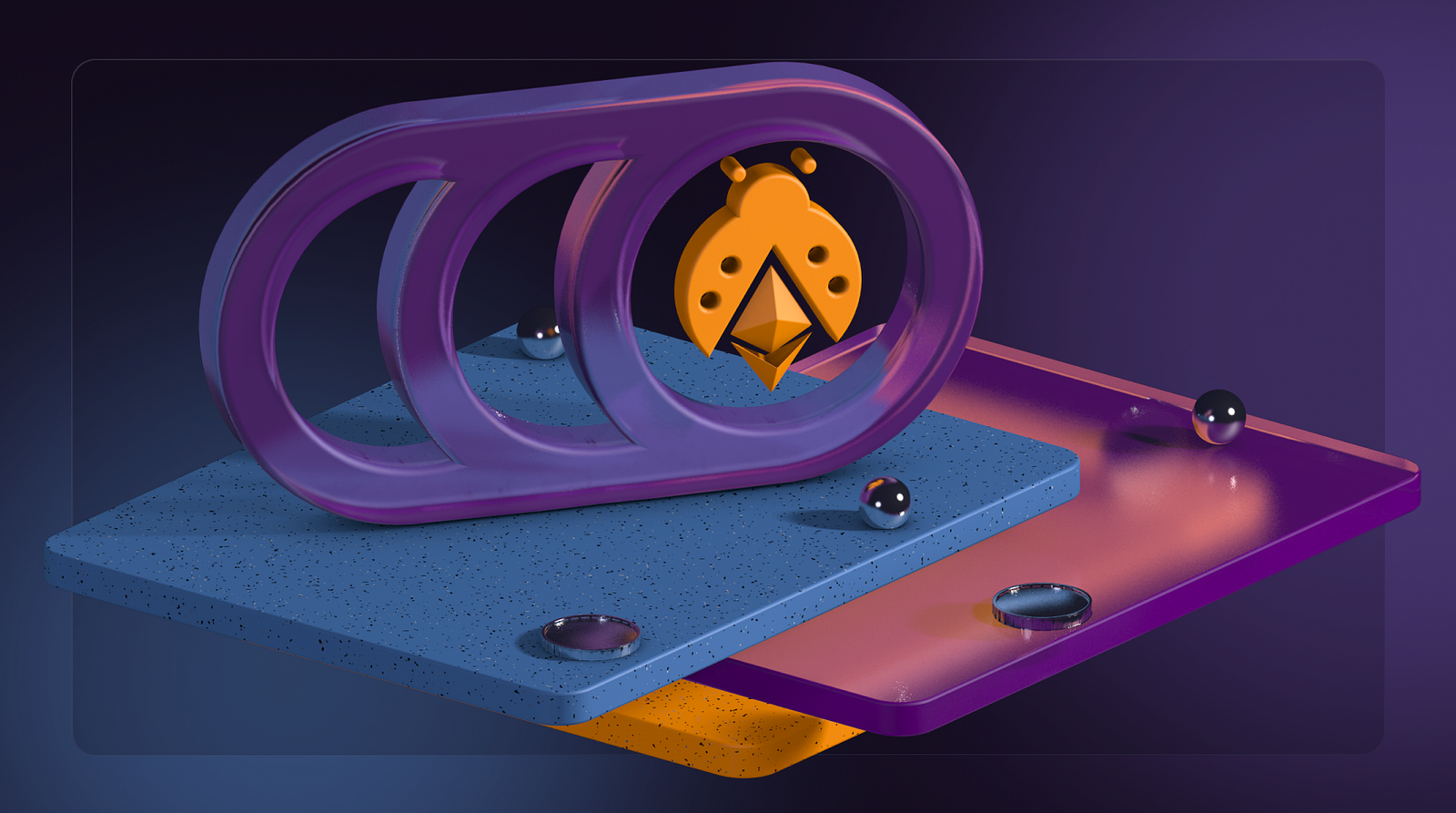
12-fold surge in new smart contracts
According to a report published by Alchemy, smart contracts deployed on Ethereum and related blockchains have witnessed a 12-fold surge over the past year. This remarkable growth is attributed to the implementation of layer 2 blockchains such as Arbitrum and Optimism.
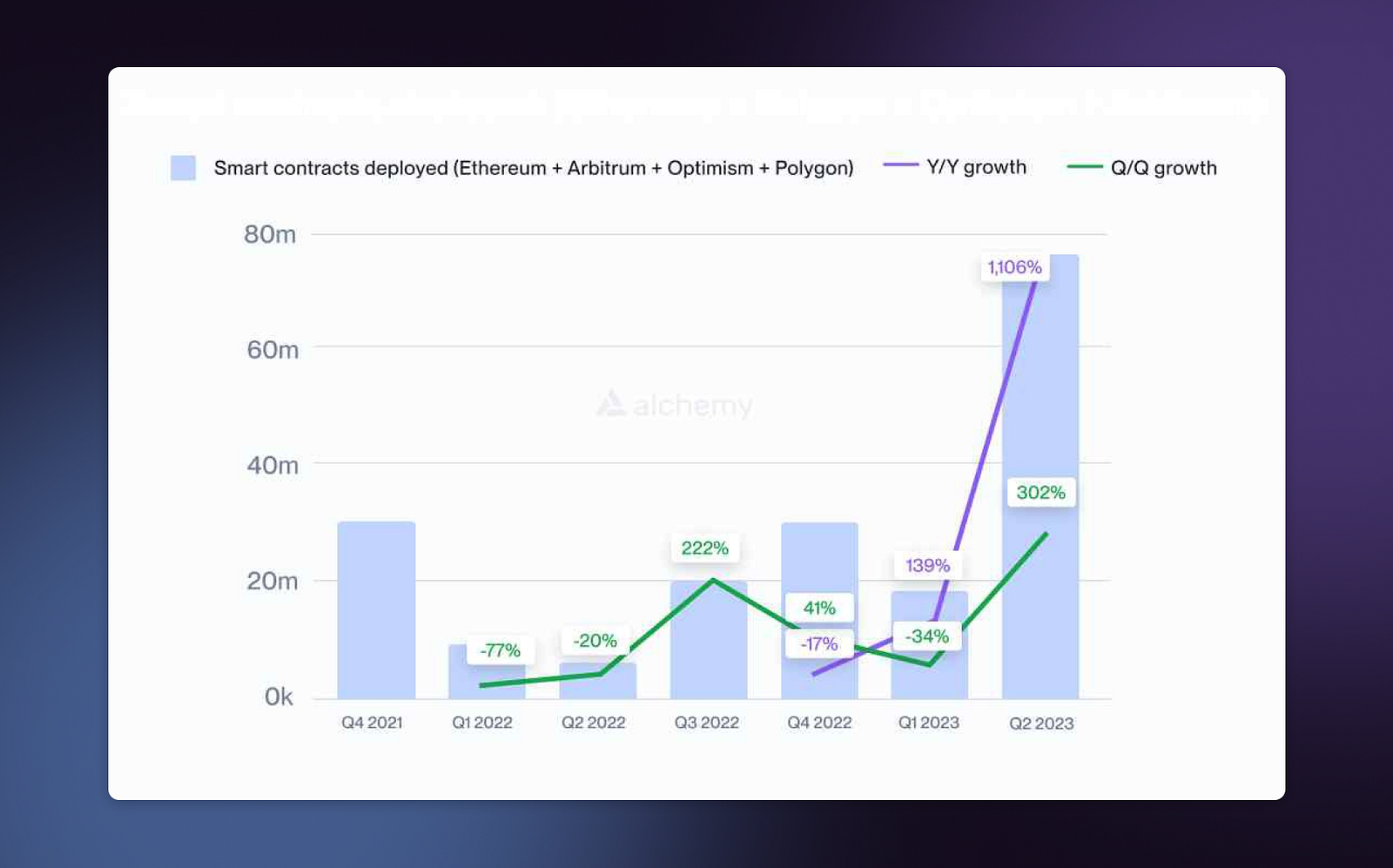
These innovations have dramatically reduced the cost of utilizing Ethereum, resulting in a year-over-year growth of 1,100% in the second quarter of 2023.
Furthermore, July marked a 1,200% increase in creating user-friendly crypto wallets. This development could indicate a broader trend of wider adoption.
Despite a 22% reduction in the number of blockchain developers over the past year, the remaining professionals have been producing smart contracts at an unprecedented rate. This increase has been facilitated by Ethereum’s layer 2 blockchains, which have optimized the platform by compressing transactions and minimizing notoriously high fees.
Account Abstraction technology is another key factor in this transformation.
Blake Tandowsky, a growth analyst at Alchemy, described this growth as a “nascent transformation within the industry.”
Ethereum developers discuss key changes and progress
On August 3, 2023, Ethereum developers gathered for the All Core Developers Execution (ACDE) call #167, a critical platform for discussing and coordinating changes to the Ethereum network. Tim Beiko of the Ethereum Foundation marked the meeting with robust discussions and significant proposals.
A central focus was EIP-4788, which aims to expose the roots of Beacon Chain blocks inside the Ethereum Virtual Machine (EVM).
Martin Holst Swende, lead security engineer at the Ethereum Foundation, proposed a transformative change to EIP-4788. He suggested converting it from a precompile, designed to enable complex cryptographic computations, into a regular contract coded in Solidity.
Swende argued that this change would increase security and decrease complexity, lessening the risk of a consensus split. Representatives from the Nethermind and Erigon EL client teams supported this proposal, though concerns were raised about the gas economics of the change.
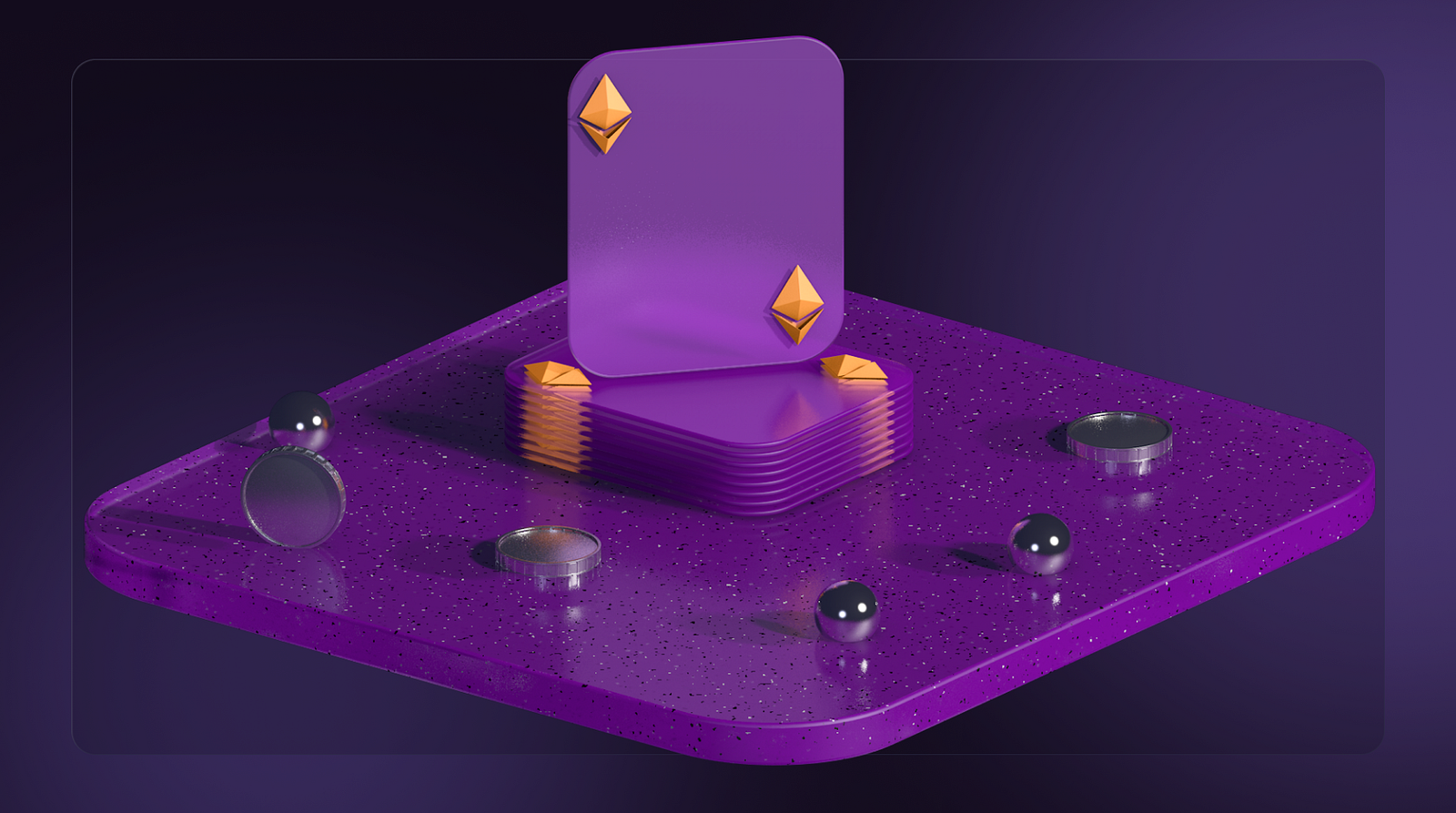
The meeting also addressed EIP-6780, concerning the deprecation of the SELFDESTRUCT opcode, with developers agreeing to merge clarifications to official EIP specifications.
Three changes to the Engine API were highlighted by Beiko, who sought developers’ thoughts on issues such as blobGasUsed and blobGasPrice for transactions and the renaming of “data gas” to “blob gas.”
Updates on Verkle Tries were shared by Guillaume Ballet and Josh Rudolf, revealing that the latest Verkle block processing times were 20% slower than MPT block processing times.
Several client teams, including Nethermind, Geth, and EthereumJS, have been participating in early implementations and testnets.
Two new EIPs related to account abstraction were presented, sparking a lively discussion on the future direction of these features on Ethereum. Concerns over potential delays to the Cancun upgrade were addressed, with Beiko suggesting expedited decisions around EIP-4788’s execution as a regular contract.
The meeting concluded with updates on testing and the Holesky testnet, a replacement for the existing Goerli testnet.
Developers spun up a testnet with 2.1 million validators spread across 420 nodes, reaching CPU limits almost immediately.
The goal for the Holesky testnet is to support 1.5 million validators, though challenges remain.
Supra partners with Plena Finance
Supra Oracles has announced a strategic partnership with Plena Finance, a leading application platform in the blockchain space. This collaboration leverages EIP-4337 Account Abstraction, significantly reducing gas fees and offering other benefits.
The partnership aims to combine the strengths of both companies, promoting mutual growth and industry advancement.
Plena Finance will explore the use of Supra’s oracle services, while both companies will share resources.
Joshua D. Tobkin, CEO of Supra, expressed excitement about unlocking the potential of blockchain technology for millions of users. Sparsh, CEO of Plena Finance, emphasized the significance of the collaboration in providing advanced protocols and cutting-edge solutions.
Supra’s mission is to connect traditional capital markets with the Web3 environment and solve the oracle conundrum. Plena Finance, on the other hand, leads in Account Abstraction technology, offering a mobile wallet with a centralized application-like user experience while ensuring complete custody of funds to users.

Polygon enters a new era of ERC-4337
CyberConnect, a Web3 social network, has launched on Polygon, leading to a remarkable surge in ERC-4337 transactions.
The momentum reached a record high on July 27th, with more ERC-4337 transactions executed on Polygon than the rest of the month combined.
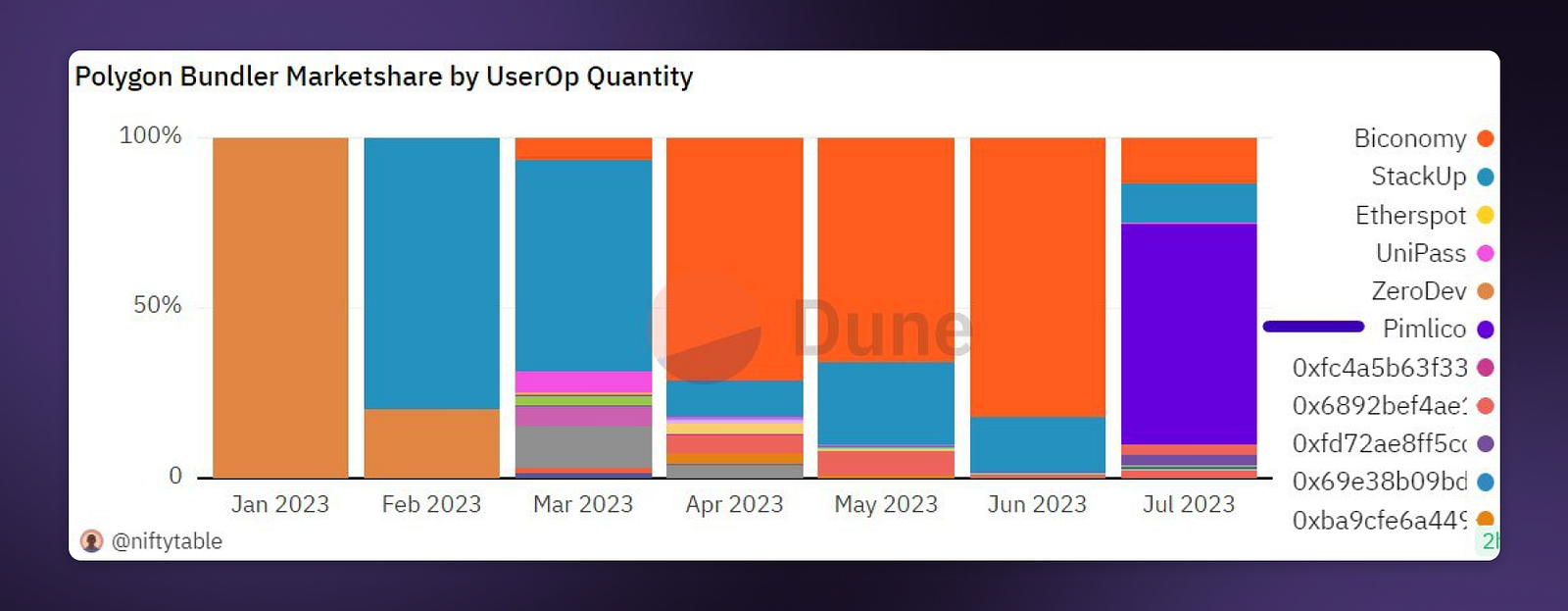
This spike was catalyzed by the launch of CyberConnect, utilizing ERC-4337 smart accounts.
Pimlico, the infrastructure layer for Ethereum’s smart contract wallets, played a significant role by bundling UserOps, becoming the largest bundler on Polygon.
As of July 29th, over 300,000 UserOps were conducted.
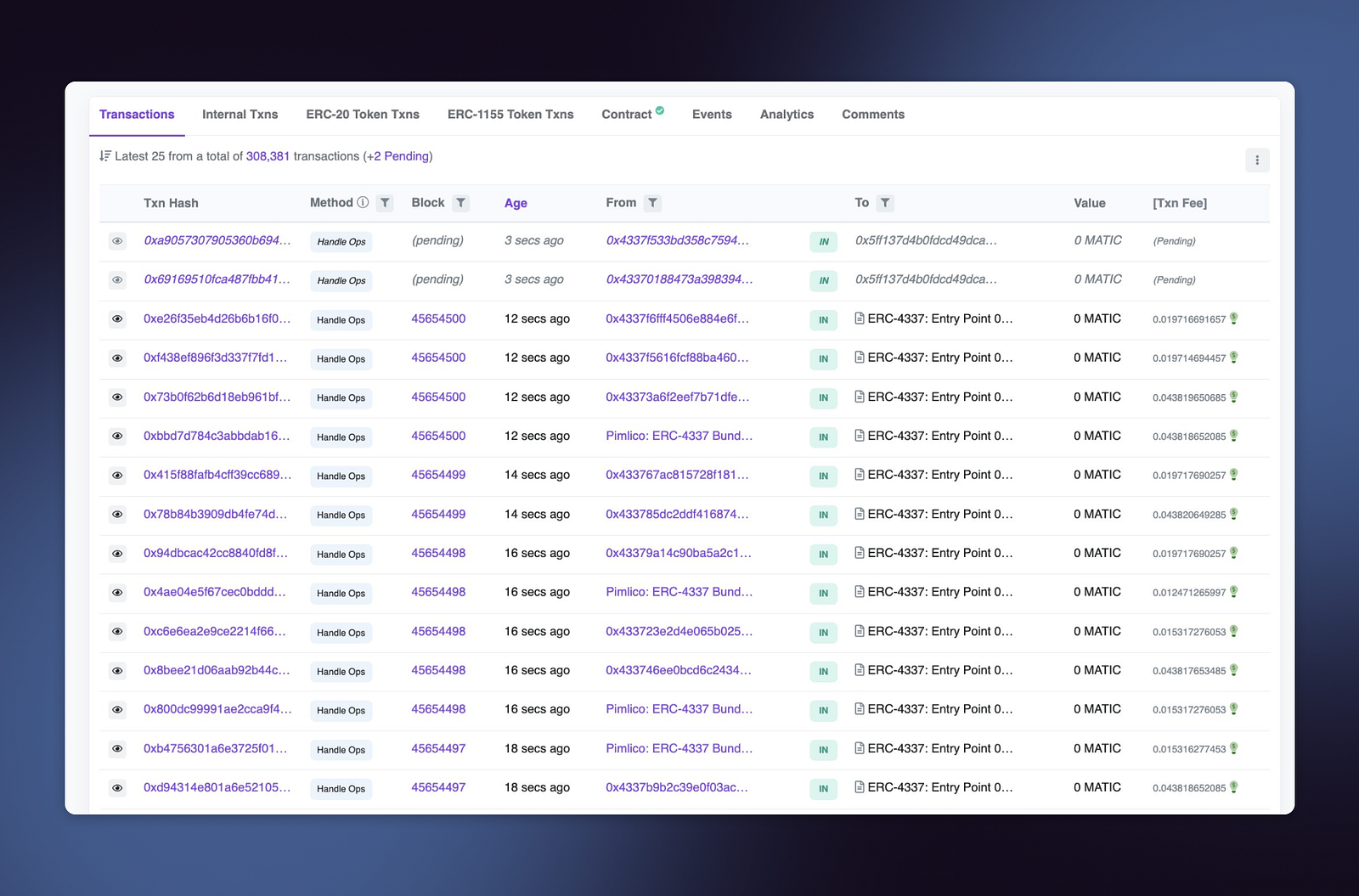
Kristof Gazso, the founder of Pimlico, celebrated the milestone on Twitter, welcoming Polygon to a “new era of ERC-4337.”
Subscribe to Etherspot’s Everything About Account Abstraction Newsletter!
Start exploring Account Abstraction with Etherspot!
- Learn more about account abstraction here.
- Head to our docs and read all about the Etherspot SDK.
- Skandha - a developer-friendly Typescript ERC4337 Bundler.
- Explore our TransactionKit, a React library for fast & simple Web3 development.
- For a plug & play integration, review the BUIDLer react component.
- Follow us on Twitter and join our Discord.
Is your dApp ready for Account Abstraction? Check it out here: https://eip1271.io/
Get In Touch:
Website | Twitter | Discord | Github | Telegram
Powered by Etherspot
BUIDLer React Component | TransactionKit | Pillar Wallet | AirdropMe

